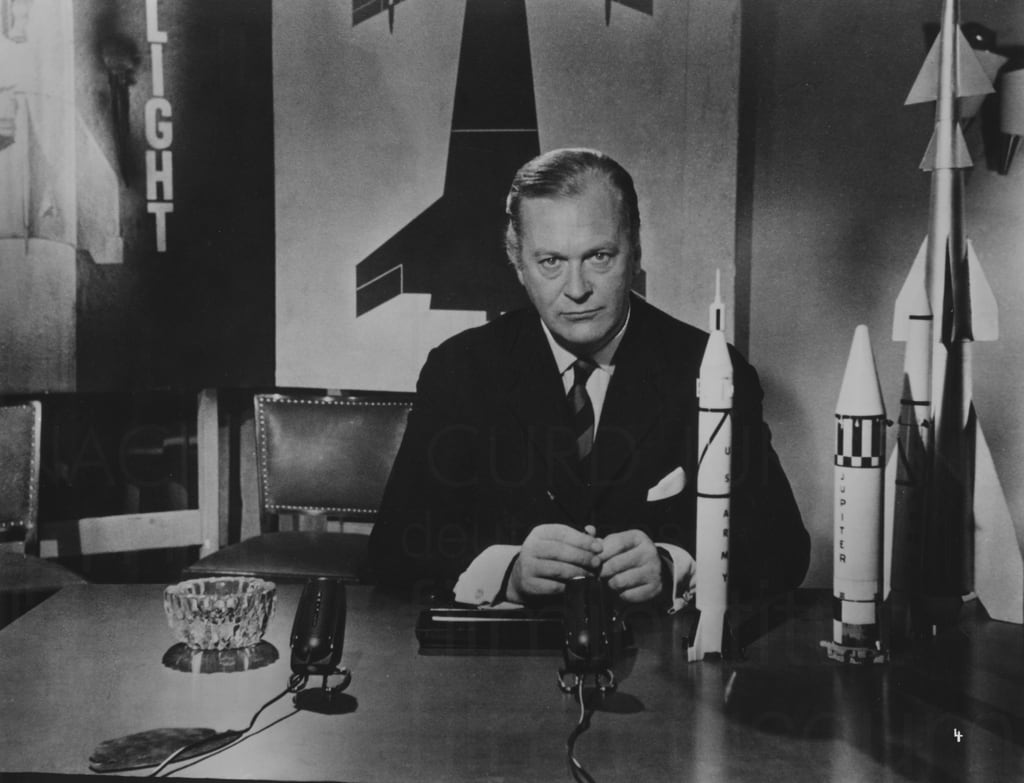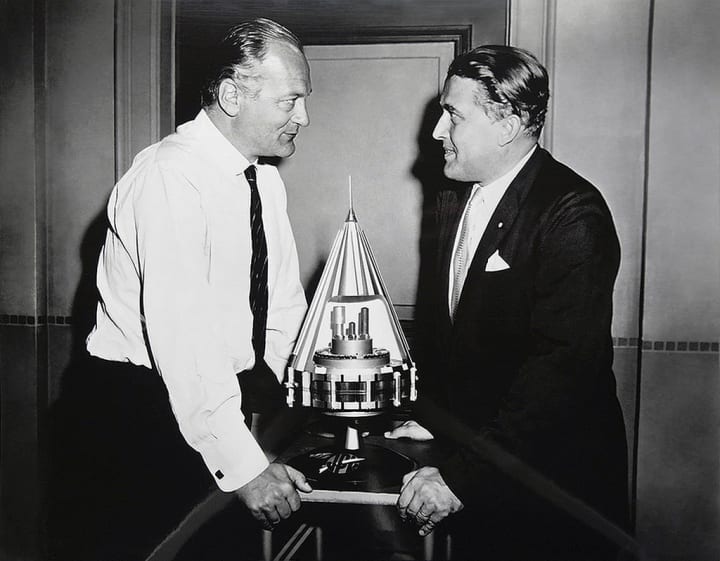Jurgens, Von Braun, & 'I Aim At The Stars'
A Look Back at the 1960 Wernher Von Braun Biopic

For those of a certain age or with an interest in the history of space exploration, the name of Wernher Von Braun will be a familiar one. Von Braun was one of the fathers of NASA's rocket program, the man who helped not only to build the massive Saturn V rocket that took the Apollo missions to the moon but also helped to sell the idea of space exploration to the American public. He was also the man behind Germany's V-2 rocket program during the Second World War, an act which (along with his potential involvement in and definite awareness of the use of slave labor to build said rockets) might also make him something of a war criminal. When Von Braun was at the height of his fame in the late 1950s-early 1960s, the idea of making a film about his life was deemed to be a good idea. The result was I Aim At The Stars, released in 1960 and which stands as an interesting historical piece if nothing else.
For one thing, there's the question of how you portray a scientist who once built weapons of war for a former enemy. Much has been said over the years about the whitewashing of not just Von Braun's war record but other Germans brought to the United States as part of Operation: Paperclip. From the point of view of someone interested in that part of the story, the film is interesting. Despite something of a reputation for whitewashing Von Braun, the film doesn't quite do that. Indeed the film's overall portrait would arguably fit in with many modern takes on the man: that he was a scientist who worked for the countryman willing to put up the funds for the research, apparently regardless of who they were. The film does portray the conflicts that happened in real-life between Von Braun and the more fanatical elements of the Nazi leadership, especially the SS (though the film, in keeping with what was publicly acknowledged at the time, doesn't portray him as actually being a member of that organization) which led to his being arrested. The appearance in the film of a skeptical US Army major turned civilian journalist also gives the film a skeptical edge, never letting the audience forget Von Barun's background completely either. As a result, the film does have some shades of gray to it though not as many as perhaps were needed.
That said, the film does simplify and occasionally fictionalize things. The latter is perhaps more of an issue since it involved an entire subplot being created involving Von Braun's secretary being an American spy (in a role played by Gia Scala) in a move that makes little sense. The simplification of real-life such as the development issues with the V-2 are largely to be expected with turning two decades plus worth of events into a film that runs less than two hours The film also, perhaps for rights reasons, features a version of the famous 1950s Disney documentary Man In Space which helped make Von Braun a household name (pictured above) but doesn't mention it or Disney by name. The results can be frustrating and slightly melodramatic at times as a result.
Indeed, there are times when the film feels more like a TV movie than something that was a must-see on the big screen. The script from Jay Dratler (based on a storyline drawn up by George Froeschel, H. W. John, and Udo Wolter) feels like that of a TV movie with occasionally stilted dialogue (a US Army officer telling his British counterpart that “I am just an observer from the US Army,” being a prime example) and scenes that seem to exist purely for means of exposition. The script also seems to spend a long time on some issues and glances over others, making it quite uneven at times. The film feels odd at times as a consequence, having the feeling of something akin to Lifetime's ill-received Liz & Dick on the tumultuous relationship of Richard Burton and Elizabeth Taylor in that it covers a lot of ground and not always admirably.

Actor Curt Jurgens with the real-life Wernher Von Braun.
Which extends to the cast as well. Though Curt Jurgens was a fine character actor and a German, he was almost completely miscast as Von Braun. Part of that is due to a lack of physical similarity between them but also because there was only about a three year age gap between them (with the real Von Braun being older) which means that despite make-up, Jurgens simply isn't believable in scenes as the younger Von Braun during the war nor in scenes with Victoria Shaw as Maria Von Braun who was twenty years his junior. Perhaps because of the script, no one in the cast really gets a shine despite occasional moments which extends from Shaw to Scala's secret agent secretary, Herbert Lom as fellow rocket scientist Anton, and James Daly as Army Major and journalist William Taggert who becomes the film's persistent American critic of Von Braun. None of the performances are bad per se but none of them are exactly stellar work either.
The film does have some things going for it. For enthusiasts of the era, there is plenty of stock footage on display from V-2s to missile tests and the climactic launch of America's first satellite Explorer One. Director J. Lee Thompson's direction as well has the occasional flourish such as the cutting in the TV appearances of Von Braun and Taggert arguing over issues regarding space flight (with many of their arguments mirroring ones we are still having decades later) and during the climactic sequence which nicely portrays the wait on the ground to learn if the satellite had made it into space.
On the whole, though, I Aim At The Stars stands as a historical document more than anything else. Despite the occasional flourish from Thompson and the presence of an actor like Jurgens, there is little to set the film aside from many others made at the time for the average viewer. It is perhaps no surprise then that it has fallen into a degree of obscurity. Yet for those who lived through the era (and the exciting NASA years of Von Braun's career after the film came out) or are interested in the life of the man who helped open the door to space, it's well worth a watch.
At least until someone else makes a film about Von Braun.
About the Creator
Matthew Kresal
Matthew Kresal was born and raised in North Alabama though he never developed a Southern accent. His essays have been featured in numerous books and his first novel Our Man on the Hill was published by Sea Lion Press in 2021.






Comments
There are no comments for this story
Be the first to respond and start the conversation.